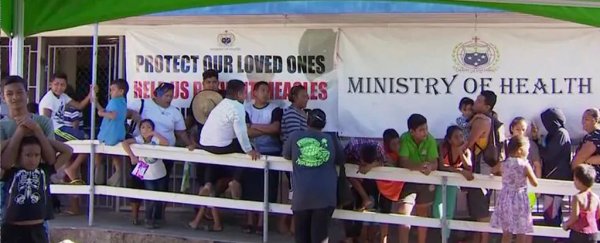Samoa announced it would shut down its government for two days so that public officials can combat a dangerous measles outbreak that has killed 53 people and infected 3,728.
The Pacific island nation has raced to vaccinate its children and other residents since an outbreak was declared on Oct. 16. Its youngest citizens are at the greatest risk, as 48 of the deaths so far have been children under the age of 4.
On Sunday, Samoan Prime Minister Tuilaepa Aiono Sailele Malielegaoi announced "all public service and all government services will be closed" on Dec. 5 and 6 "in order to allow all public servants to assist with the mass vaccination campaign throughout the country."
The government's closure is the most drastic measure Samoa has taken to combat the outbreak so far. Officials have already begun a mass vaccination campaign aimed at young children and women of childbearing years, inoculating 58,150 people as of Sunday.
Schools have been closed, children are banned from large public gatherings, and parents have been urged to bring their children to a doctor at the first signs of illness.
Several countries, including Australia, New Zealand, Britain, and China have sent medical experts and aid, and organizations like the Red Cross and UNICEF are also working to mitigate the outbreak. The US has dispatched a team of experts from the Centers for Disease Control to the island nation to help track the outbreak.
The story of Samoa's outbreak mirrors one unfolding around the world: a decrease in vaccination rates due to persistent disinformation about the safety of vaccines, combined with international travel, has sent measles rates skyrocketing, with outbreaks in countries where the disease had been thought eliminated.
This year, the United States has seen its worst measles outbreak since 1992, with 1,261 cases reported between Jan. 1 and Nov. 7. The majority of those infected were not vaccinated.
Measles hot spots have emerged throughout Pacific countries where it was once eliminated, including Australia, New Zealand, and Japan.
Samoan officials say they believe the outbreak was initially spread by a traveller from New Zealand, the AP reported. Once in the country, the virus found a population with an uncommonly low vaccination rate.
Before the epidemic, Samoa's vaccination rate stood at only 31 percent, according to the World Health Organization, and vaccination coverage has declined in Samoa since 2013, according to WHO and UNICEF data. Fears about the safety of the vaccine accelerated in 2018, after two babies in Samoa died when their vaccinations were mixed incorrectly, the BBC reported.
Noted anti-vaccine activist Robert Kennedy Jr. visited the country in June and met with an Australian Samoan also involved in that effort, The Washington Post reported last week.
Now, the country is scrambling to vaccinate as much of its population of 196,000 as swiftly as possible.
On Sunday, the prime minister urged Samoans to listen to medical experts and to put aside their fears of vaccines.
"Let us work together to encourage and convince those that do not believe that vaccinations are the only answer to the epidemic," Tuilaepa said. "Let us not be distracted by the promise of alternative cures."
2019 © The Washington Post
This article was originally published by The Washington Post.
